|
This
is the sixth special featured in this magazine since the section
was launched in December 2003. And, surprise, surprise-as you can
gather, this really, er, surprised us-there's some degree of overlap.
For instance, five of the companies on this list count among our
20 Companies To Watch In 2004 and two, among our Fastest Growing
Companies. Clearly, two of our unaired assumptions-one, about companies
that could do well in the future not exactly rewarding investors
at this point in time, and two, about fast growth not really translating
into immediate rewards for the shareholder-now sound horribly fallacious.
The good news: if our listings indeed be a sure-fire route to wealth,
it might make sense to revisit them. Sorry, we have no extra copies
of old issues.
-Narendra Nathan
 |
| Venu Srinivasan/ CEO: Enjoying the spoils
of victory |
TVS MOTOR
4-stroke Fast Tracker
From a two-wheeler manufacturer that
most people had written off (share price in September 2001: Rs 65)
to India's most investor-friendly company (its share price touched
Rs 1,100-levels in late 2003, and the company opted for a 10-for-1
stock split to enhance liquidity), TVS Motor has come a long way
in a short time. Attribute that to Victor, the company's best-selling,
indigenously developed four-stroke motorcycle. TVS was quick to
share the gains with its shareholders: in 2000-01, it declared a
dividend of 70 per cent and in subsequent years this figure rose
to 90 per cent and 120 per cent. And although the company's profits
for the three months ended December 31, 2003, saw a slight dip as
compared to the corresponding period in 2003 (largely because of
declining sales of the oldest motorcycle in its portfolio, Max),
analysts see no cause for concern. TVS will launch eight new two-wheelers,
including six motorcycles over the next 15 months and is eyeing
manufacturing options in Indonesia and the Philippines. "We believe
the CEO is only the managing trustee of the shareholders," says
Venu Srinivasan, CMD, TVS Motor. Well, this trustee has delivered.
-Nitya Varadarajan
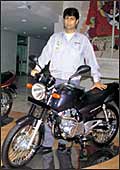 |
| Rajivranjan Bajaj/ Joint MD: Everything
adds up |
BAJAJ AUTO
Ace Rider
Not too long ago, Bajaj Auto was #4
in India's booming motorcycles market and #1 in its flagging scooters
one. Today, post a product-led strategy orchestrated by joint MD
Rajivranjan Bajaj, the company is #2 in the motorcycles market with
a 25 per cent share. And apart from taking on leader Hero Honda,
it wants to go global. And happy investors-the company's average
dividend over the past three years is 120 per cent-know the entire
story. "Bajaj gives us information on the industry and briefs us
regularly," says Kalpesh Parekh, an analyst at Mumbai brokerage
ASK Raymond James. That isn't an empty claim: Bajaj Auto is among
the few companies that give out product-wise revenue break-ups.
It has helped.
-Swati Prasad
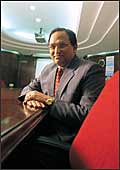 |
| M.S. Ramachandran/ CMD: It isn't just
about refining |
INDIAN OIL CORPORATION
Fruits Of Integration
M.S. Ramachandran is on a high. The
59-year-old CMD of Indian oil Corporation (IOC) has just seen his
company grow its net profit for the three months ended December
31, 2003, by 209 per cent (as compared to the corresponding period
of 2002) to a whopping Rs 2,403 crore. Much of this has come on
the back of improved gross refining margins, up from Rs 134 per
tonne in 2002 to Rs 182 in 2003. However, it is his forays into
exploration (IOC recently acquired a 35 per cent stake in Premier
Oil's Cachar Block in Assam) and into ventures in Sri Lanka and
Mauritius that is making investors in India's largest commercial
enterprise happy (sales: Rs 1,19,848 crore in 2002-03). "By entering
into exploration and by making forays abroad, IOC is clearly derisking
its business from the volatility in oil prices that affects refining
margins," says Sandeep Biswas, Senior Manager, Accenture Consulting.
That it is.
-Ashish Gupta
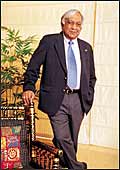 |
| Subir Raha/CMD: Its quest for the holy
grail is global |
ONGC
Truly Black Gold
Any company that announces an interim
dividend of 140 per cent for the year and revenues for the three
months ended December 31, 2003, of Rs 7,354 crore belongs in this
list. Most readers probably know all there is to about Oil and Natural
Gas Corporation (ONGC), courtesy the company's high-decibel advertising
blitz in the run-up to its IPO. Here is an encapsulation: the company
accounts for 84 per cent of India's annual production of oil and
gas; its wholly-owned subsidiary ONGC Videsh is involved in exploring
oil in Sudan, Vietnam, Russia, Myanmar, and Angola; it is investing
Rs 3,700 crore in deepwater oil exploration over the next five years;
and Chairman Subir Raha hopes to transform the state-owned behemoth
into a $100 billion (Rs 4,600 crore) integrated oil and gas major
over the next five years. Then, as Sanjay Kaul, Principal Consultant
(Oil & Gas Group), PricewaterhouseCoopers, points out, "Better technology
will reduce the costs of crude and gas production, but the import
price parity at which crude will be sold provides a handsome premium."
It shows.
-Ashish Gupta
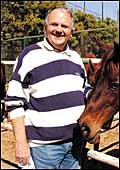 |
| Brian Tempest/CEO-designate: Not all in
the family for this one |
RANBAXY LABORATORIES
Governance Play
How investor friendly can it get
when the chairman of the company is an independent director? Ranbaxy
Laboratories created history of sorts when it elected Tejendra Khanna,
a retired IAS officer and a former Lt. Governor of Delhi, as its
Chairman in July 1999. The company's board, which has 10 independent
directors out of 13, also adopted a written internal code of corporate
governance the same year. Some analysts are not convinced with the
reasons being proffered for the exit of CEO D.S. Brar, but none
has reason to complain about Ranbaxy's dividend history (an average
of 108 per cent over the past three years).
-Sahad P.V.
 |
| D. Krishna/ Additional Chief Executive: Restructuring
for growth |
LIC HOUSING FINANCE
Stock With A View
Investors love growth. And of that,
LIC Housing Finance has plenty. Over the last five years, it has
grown its disbursements by 27 per cent year on year, and despite
the burgeoning base, there's plenty of head room. Says Sunil Shah,
MD, HDFC Securities: "The company is well focussed and, therefore,
should grow at 25 per cent CAGR for the next two years." Besides,
as the interest cost of the funds it borrows from parent LIC comes
down, LIC Housing's margins should improve further. Meanwhile, Additional
Chief Executive D. Krishnan is responding to the industry's fierce
competition by restructuring. He's splitting the company's 115 offices
into back offices (20) and marketing offices (95). To increase recovery,
he has appointed special recovery officers-150 of them. "It is a
novel way of managing defaults," says Krishnan. All investor-friendly
ideas are welcome.
-Narendra Nathan
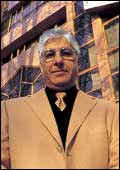 |
| M.Y. Khan/Chairman: It's not all happenstance |
JAMMU & KASHMIR BANK
Banker Of Choice
If Jammu & Kashmir Bank (J&K
Bank) did not enjoy a special status (it's a banker to the state
government and Reserve Bank of India's official agency in the state),
would it still be a stockmarket darling? Perhaps. Its NPA as a percentage
of total advances is a bare 1 per cent, it's got a finger in the
insurance pie (with MetLife), and it is spreading out to other parts
of the country. Recently, the bank, whose April-December profits
jumped 31 per cent to Rs 308 crore, roped in PricewaterhouseCoopers
to formulate a business plan, including issues such as succession
planning and hr. "We want to be a leading player in the sector,"
says Pervez Ahmed, Company Secretary.
Going by its stock price, up 450 per cent to Rs 500 in the last
12 months, its 50,000 shareholders do seem to think that it stands
a fair chance.
-Kushan Mitra
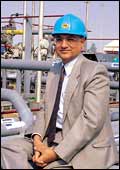 |
| Prashanto Banerjee/ CMD: Architect of
the transformation |
GAIL
All Charged Up
When GAIL says "gas and beyond" it
actually means it. Till a couple of years ago, it was just a gas
transmission company. Today, headed by CMD Prashanto Banerjee, it's
an integrated player present in every point of the value chain-from
exploration and production to marketing of natural gas. The market
has rewarded GAIL's transformation by bumping its valuation up from
Rs 5,328 crore in December 2001 to Rs 19,175 crore currently. While
its earnings last year were an impressive Rs 1,639 crore, it could
rise even further, considering that gas prices are still marked
down by the government to 40 per cent of international prices.
-Ashish Gupta
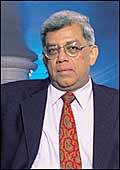 |
| Deepak Parekh/ Chairman: Business, the
clean way |
HDFC
House Of Trust
The management focus is on ensuring
value creation for all its stakeholders," says Keki Mistry, Managing
Director, HDFC. Coming from anybody else, it would have been a mere
platitude. But this is HDFC. For generations, investors have come
to trust the housing finance major under Deepak Parekh, and before
that his uncle H.D. Parekh. "HDFC is excellent in terms of balance
sheet disclosures," notes Jigar Shah, Head of Research, K.R. Choksey
Securities. Unlike some other companies, HDFC has had an investor
grievance cell for the past 11 years, and currently boasts of a
dozen staff, four of whom are qualified company secretaries.
-Shilpa Nayak
 |
| Naveen Jindal/ Executive VC and MD: God
of small things |
JINDAL STEEL & POWER
Steel Also Glitters
The Delhi-based O.P. Jindal group
company would have you, the investor, know that you aren't merely
riding a wave-the steel boom, that is. Rather, the stock is up three
times since 2001 to Rs 600 despite a 2:1 split because of the company's
professional strength. (Its CEO Vikrant Gujral is an industry veteran
of 40 years.) We'll know if that's a stretch when the next steel
downturn comes along, but for the moment it seems Jindal Steel &
Power can do no wrong. Says Sushil Maroo, Vice President (Corporate
Finance): "Our dividends have kept rising over the past few years,
and the rationale behind the split was to get the retail investor
back into our fold and not make the scrip too unaffordable." Adds
Naveen Jindal, Executive VC and MD of the company: "It's about doing
the small things right." Apparently, that also adds up to a better
big picture.
-Kushan Mitra
 |
| A.M. Naik/MD: The future is bright |
LARSEN & TOUBRO
Good Genes
As a company founded by technocrats
and run thereafter by a board, L&T has traditionally evoked a great
deal of trust among its retail investors. And that despite the battles
for its control, more recently fought by the A.V. Birla group for
the cement business. "It is our Managing Director (A.M. Naik)'s
diktat not to have even a single aggrieved investor," says D. Shankar,
the company's Compliance Officer. The current fiscal has been exceedingly
good for L&T. At Rs 253 crore, its nine-month net profit is up 52
per cent. But what has investors licking their chops is the Rs 17,500
crore of orders on the books.
-Shilpa Nayak
 |
| A.K. Purwar/ Chairman: Big Daddy |
STATE BANK OF INDIA
A Nimble Colossus
Every month, the deputy Managing Director
and CFO of State Bank of India (SBI) receive a status report on
investor grievances. But that's not really the reason why the banking
behemoth figures on our list. Rather, it's because India's biggest
bank is getting bigger and better still. For instance, aggressive
loan recovery has lowered its NPA as a percentage of total advances
to 2.88 from 4.50 in March 2003, and it is tapping retail business
to grow faster. Also, SBI has a long list of subsidiaries and associates
that are actually doing well and that, says the bank's Chairman
A.K. Purwar, "is adding value". Although SBI's stock price has increased
93 per cent in the last 12 months, analysts feel it is still undervalued,
given its dominant position in an economy that is surging. That
means SBI investors can expect better returns in the days ahead.
-Narendra Nathan
SUNDARAM-CLAYTON
Values-Driven
For a company that doesn't get traded
much on the bourses (simply because the TVS family along with the
foreign JV partner owns a huge 80 per cent of the equity) Sundaram-Clayton
is a surprise entrant. Then, again, it's not so surprising. The
brake actuation systems and castings maker is sister company of
our list topper, TVS Motors, and is managed by the same anchored-in-good-old-values
CEO, Venu Srinivasan. Despite the auto downturn of the late 90s,
Sundaram-Clayton has steadily grown and even won two prestigious
awards for quality: The Deming Prize and the Japan Quality Medal.
Small wonder, then, that its share price has soared from Rs 100
in 2001, to Rs 601 currently. Says its Executive Director, H. Lakshmanan:
"We don't just focus on numbers, but overall corporate values."
It shows.
-Nitya Varadarajan
BANK OF INDIA
The Promise Of Clean Up
Ordinarily, investors would steer
clear of banks that have high NPAs. And Bank of India (BOI) has
Rs 2,000 crore of them, which is nearly 5 per cent of its total
advances. So why do investors still love BOI? For one, it has been
paying out handsome dividends over the last three years. For example,
last year it paid out 30 per cent and this year it has returned
20 per cent already. "Bank of India continues to be a good dividend
yield play," notes Vinit Sambre, Analyst, IL&FS Investmart India.
More importantly, it is also one of the lowest valued banks in the
market today because of its high NPA levels. But its Chairman and
Managing Director, M. Venugopalan, has a clear plan. For starters,
he has brought in better credit appraisal and monitoring systems
to prevent fresh NPAs. And to recover the bad loans already on the
books, he's looking to the new Securitisation Act. "We plan to halve
our NPAs by the end of next fiscal," says Venugopalan. Investors
are watching.
-Narendra Nathan
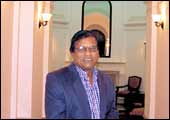 |
| S. Behuria/CMD: Profits boil over, and
mindset changes too |
BHARAT PETROLEUM CORP.
A Slick Show
Ever since oil prices were deregulated
in April 2002, oil companies have been on a roll BPCL is one of
them. That doesn't mean the company has not worked hard at shedding
its PSU baggage. "It's been our endeavour to optimise investor returns,"
says Chairman S. Behuria. BPCL's petrol stations were the first
to sport convenience stores and market fuel as branded products.
International pricing of fuel has helped bump up its market value
from Rs 5,754 crore three years ago to Rs 13,170 crore currently.
Is that a slick show or what?
-Shilpa Nayak
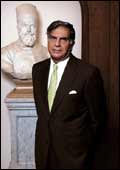 |
| Ratan Tata/Chairman: A name you can trust |
TATA MOTORS
Back On Fast Lane
In December 2002, when Tata Motors
conducted a shareholder satisfaction survey, it scored 6.6 out of
10. Last December, it conducted another such survey, and although
the figures are still being compiled, chances are it'll score better.
Why? Business is looking good. Passenger car sales are clipping,
commercial vehicle sales are also booming because of a revival in
demand, and the company is making some big moves-like its recent
deal to acquire Daewoo Heavy Commercial Vehicles in Korea for Rs
465 crore. It gives Tata Motors access to the Korean and Chinese
markets, besides the Daewoo marque. "We communicate our strategy
to our shareholders," says Praveen Kadle, ed (Finance and Corporate
Affairs), Tata Motors. This time around, the shareholders are listening.
-Swati Prasad
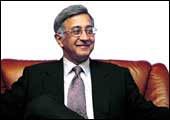 |
| Baba Kalyani/Chairman: Chasing the top
slot |
BHARAT FORGE
MNC in the Making
An auto components company that gives
region-wise break up of its financial performance? That's Bharat
Forge for you. The new Bharat Forge, that is. Not too long ago,
the Pune-based manufacturer of forgings was like any other family-managed
company in the industry. But over the last few years, it has taken
on a totally different mindset. Says a Mumbai-based analyst: "Bharat
Forge has become very open and transparent in the last couple of
years." Explains Amit Kalyani, the company's VP & CTO: "There's
nothing complicated about being investor friendly.'' As Chairman
Baba Kalyani chases his dream of becoming the world's largest forgings
maker by 2008, he will need his investors solidly behind him. For
instance, he needs Rs 500 crore in investment to up capacity and
top revenues of Rs 2,000 crore by 2008. Fortunately for him, when
a company is growing so fast, its investor-friendly quotient goes
up automatically.
-Swati Prasad
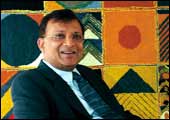 |
| Prithvi Raj Jindal/Chairman: Cashing in
on the energy sector boom |
SAW PIPES
Stuff of Pipedream
In the past 12 months, while the sensex
has risen some 80 per cent, P.R. Jindal's Saw Pipes, an object of
sympathy in the early 90s, has zoomed three times faster (250 per
cent). That's a function of the oil sector, Saw Pipes' primary customer.
New pipelines are being constructed in India, and a war-ravaged
Iraq will also need to rebuild its pipelines. Jindal's next move:
add water pipes to the portfolio to reduce reliance on the oil sector.
-Kushan Mitra
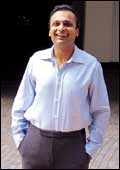 |
| Anil Ambani/ Chairman: Raising the bar |
BSES
Surge Factor
If 10 million consumers in Mumbai
spread over 384 sq km don't have to worry about outages, it's part
courtesy BSES. The Reliance group-owned power distribution company,
which actually web casts its annual general meetings, has an impressive
reliability rate of 99.99 per cent and the least system loss figure
of 11.60 per cent. Now as part of a group that spawned the equity
culture in India, BSES may get even more investor savvy. Says Anil
Ambani, Chairman, BSES: "Investor friendliness is a core corporate
value that we pursue in order to achieve our vision of (being) one
of the most admired utility companies in the world." With power
distribution just taking off, BSES has the whole country to spread
out to.
-Shilpa Nayak
 |
| Y. Gopala Rao/Chairman and Managing Director:
Can't go wrong with BEL |
BHARAT ELECTRONICS
Changed Circuitry
Being a monopoly, at least in certain
segments, helps. Just ask Bharat Electronics Limited's (BEL) head
honcho Y. Gopala Rao. The PSU, primary supplier of electronics to
India's armed forces, is sitting on an order book of Rs 6,000 crore.
This fiscal, its nine-month sales grew 32 per cent to Rs 1,777 crore
and net profits to Rs 193 crore-a 52 per cent jump. While BEL's
civilian forays like manufacture of electronic voting machines,
pc motherboards (with Intel) and medical equipment (GE) haven't
been as successful, it has managed to triple its turnover and grow
net profit eight times over the last 10 years. Says S. Subramanyam,
MD, Ascent Securities: "BEL is a good long-term bet." Almost certainly,
some investors will vouch for it.
-Venkatesha Babu
|
